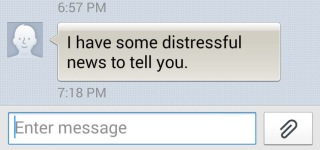Your friend has a cancer story. Sharing can be caring.
 Four times in less than twelve months, I’ve received texts from friends that start something like this: “I have some distressful news . . . ” The bad news unfolded into stories of doctors, hospitals, and scary procedures. The stories belonged to my friends, not to me, but I shared the stories. Mostly to and with other friends, but sometimes I shared these stories that didn’t belong to me outside of my circle of friends. I think I shared the stories responsibly.
Four times in less than twelve months, I’ve received texts from friends that start something like this: “I have some distressful news . . . ” The bad news unfolded into stories of doctors, hospitals, and scary procedures. The stories belonged to my friends, not to me, but I shared the stories. Mostly to and with other friends, but sometimes I shared these stories that didn’t belong to me outside of my circle of friends. I think I shared the stories responsibly.
But how can I be sure?
Normally, I would not ask myself this question, but a couple of the most recent distressful-news stories were shared abusively. So I had to ask myself: “Am I oversharing?”
I don’t think I’m alone in this. We receive bad news from a friend (cancer, divorce, collapse, death, accidents, drug problems), and the wildfire of story sharing breaks out. Unlike yesteryear when stories moved slowly as they navigated landlines, rotary phones, and handwritten letters, today’s stories are fanned by cellphones and social media, and the wildfire engulfs everyone in an instant.
Most often, the sharing is genuine, a loving effort to let other friends and the community know so that the support network can kick in. In less elevated iterations, the sharing is simply gossip. In its most banal form, the sharing is derisive, a weapon to undermine those who are already suffering.
But what about that place between genuine sharing and gossip? You were there if you ever asked yourself: “Why did I share this with them?” or “Would my friend be upset that I told them?”
My midlife throttle is wide open, and, unfortunately, distressful news is the new normal.
I created some guidelines for navigating those moments I feel compelled to share a friend’s story. Before I unveil them, a tiny confession:
- Being the first to inform another friend about the news can be oddly satisfying. I’m not proud of it, but there it is.
- Not telling a friend’s story can sometimes be less genuine than sharing it.

Remember the genuine vs. gossip, vs. weapon? Along those lines, I roughed out basic levels of sharing to use as a guideline.
- Sharing helps my friend. Does it help spread the news, set up a support network, and so on? If yes, share. If not, next question.
- Sharing helps me. Is it on my my mind, does it impact my performance or mood, am I expanding the prayer circle, can I share it without violating my friend’s trust or privacy? If yes, share. If not, next question.
- Sharing is part of a casual conversation outside of the circle that includes my friend. At this point, the only relevant question is: “Does it violate my friend’s trust or privacy?” If yes, don’t share.
For me, there are no more questions. If you made it this far and think there should be more, these are the definite don’ts:
- Sharing is just an anecdote. If it is just gossip, don’t share.
- Sharing is an excuse. If this is a way to get out of work or an obligation, an excuse to ask for money, do not share.
- Sharing is a weapon. Wow. You’re not a friend.
The golden rule applies. Your friend is distressed. He/She needs a good friend. Be good. Share responsibly.
Related post: I’m Lifting You Up.
Copyright © 2015 by Pennie Nichols, All Rights Reserved.


Too true. Tapping into our own motivation/intention is paramount before sharing. Thank you for “sharing” your guidelines and reminding us of the need to check in.
I think you make some great points! I had a peripheral friend act surprised when I said I was not aware of a mutual friend’s heartbreaking story. I saw flash across her face a look of victory. Yes there are people out there who use other people’s story as power for themselves. End of this story, I called the friend with my heartfelt condolences.
I have TOTALLY been in that place of understanding how oddly satisfying it can be to share bad news…I love your advice! It really is about asking ourselves what our motivation is.
Yes, Karen! Well put. This should come naturally, but in our current culture of oversharing everything, it is important than ever to monitor our motivation.